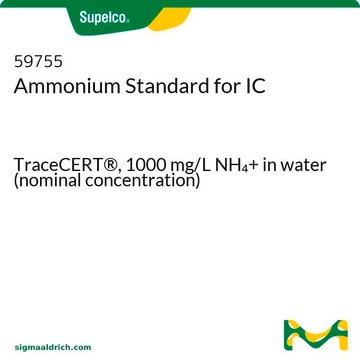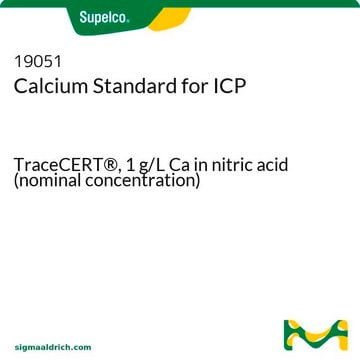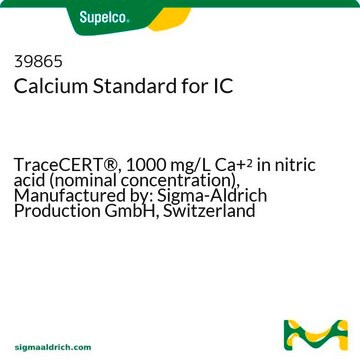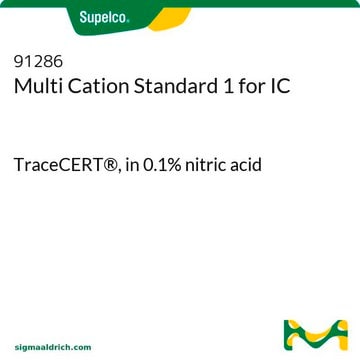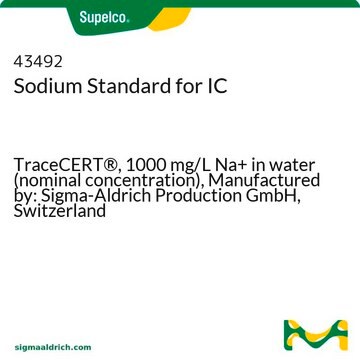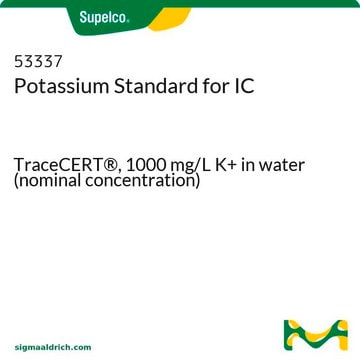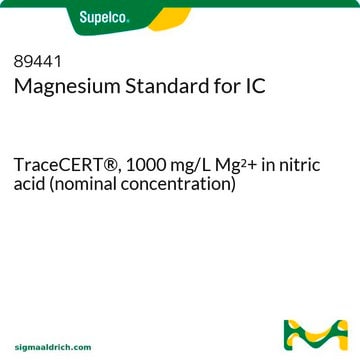55517
Methanesulfonic acid solution
0.1 M CH3SO3H in water (0.1N), eluent concentrate for IC
Sinónimos:
Methanesulfonic acid solution
Iniciar sesiónpara Ver la Fijación de precios por contrato y de la organización
About This Item
Fórmula lineal:
CH3SO3H
Número de CAS:
Peso molecular:
96.11
Beilstein:
1446024
Número MDL:
Código UNSPSC:
12161700
ID de la sustancia en PubChem:
NACRES:
NB.21
Productos recomendados
Nivel de calidad
concentración
0.1 M CH3SO3H in water (0.1N)
técnicas
ion chromatography: suitable
cadena SMILES
CS(O)(=O)=O
InChI
1S/CH4O3S/c1-5(2,3)4/h1H3,(H,2,3,4)
Clave InChI
AFVFQIVMOAPDHO-UHFFFAOYSA-N
¿Está buscando productos similares? Visita Guía de comparación de productos
Descripción general
This eluent concentrate for ion chromatography is determined by potentiometric titration. Content and expiry date can be found on the certificate.
Aplicación
- Design of a new nanocomposite based on Keggin-type [ZnW(12)O(40)](6-) anionic cluster anchored on NiZn(2)O(4) ceramics: Explores the synthesis of advanced materials using Methanesulfonic acid, contributing to developments in energy storage and catalysis technology (Rezvani et al., 2024).
- Nanosuspensions in ophthalmology: Overcoming challenges and enhancing drug delivery for eye diseases: Discusses the role of Methanesulfonic acid in the formulation of nanosuspensions, enhancing therapeutic efficiency in ophthalmologic applications (Fathi-Karkan et al., 2024).
- Building Flame-Retardant Polymer Electrolytes via Microcapsule Technology for Stable Lithium Batteries: Methanesulfonic acid may be utilized in the synthesis of flame-retardant materials for safer lithium battery technologies, addressing critical needs in electronic manufacturing (Zhang et al., 2024).
- Catalysts for C-N coupling in urea electrosynthesis under ambient conditions from carbon dioxide and nitrogenous species: Highlights the application of Methanesulfonic acid in developing catalysts for green chemistry processes, particularly in the efficient synthesis of urea from environmentally benign sources (Yang et al., 2024).
Ligadura / enlace
Visit the IC Portal to learn more
Nota de preparación
Prepared with methanesulfonic acid and high purity water (18.2 MΩ, 0.2 μm filtered)
Producto relacionado
Referencia del producto
Descripción
Precios
Código de clase de almacenamiento
12 - Non Combustible Liquids
Clase de riesgo para el agua (WGK)
nwg
Punto de inflamabilidad (°F)
Not applicable
Punto de inflamabilidad (°C)
Not applicable
Equipo de protección personal
Eyeshields, Gloves
Elija entre una de las versiones más recientes:
¿Ya tiene este producto?
Encuentre la documentación para los productos que ha comprado recientemente en la Biblioteca de documentos.
Los clientes también vieron
Chris Twelves et al.
Breast cancer research and treatment, 148(3), 553-561 (2014-11-09)
Data from two phase 3 studies of eribulin were pooled in analyses initially requested by the European Medicines Agency to assess whether specific patient subgroups, previously treated with an anthracycline and a taxane, benefited from eribulin. Study 305/EMBRACE included women
Cassandra J Gaston et al.
Environmental science & technology, 44(5), 1566-1572 (2010-02-04)
Dimethyl sulfide (DMS), produced by oceanic phytoplankton, is oxidized to form methanesulfonic acid (MSA) and sulfate, which influence particle chemistry and hygroscopicity. Unlike sulfate, MSA has no known anthropogenic source making it a useful tracer for ocean-derived biogenic sulfur. Despite
Solvejg Jørgensen et al.
Physical chemistry chemical physics : PCCP, 15(14), 5140-5150 (2013-03-02)
The gas phase reaction between methane sulfonic acid (CH3SO3H; MSA) and the hydroxyl radical (HO), without and with a water molecule, was investigated with DFT-B3LYP and CCSD(T)-F12 methods. For the bare reaction we have found two reaction mechanisms, involving proton
Renata Solarska et al.
Nanoscale, 4(5), 1553-1556 (2012-02-01)
Nanostructuring of semiconductor films offers the potential means for producing photoelectrodes with improved minority charge carrier collection. Crucial to the effective operation of the photoelectrode is also the choice of a suitable electrolyte. The behaviour of the nanostructured WO(3) photoanodes
Neal W Sach et al.
Organic letters, 14(15), 3886-3889 (2012-07-18)
A general synthesis of aryl ethers from primary and secondary alcohols and aryl mesylates is presented. The reaction proceeds via a sulfonyl-transfer mechanism. In this paper, we compare the sulfonyl transfer reaction to Mitsunobu ether formation. The reaction can be
Nuestro equipo de científicos tiene experiencia en todas las áreas de investigación: Ciencias de la vida, Ciencia de los materiales, Síntesis química, Cromatografía, Analítica y muchas otras.
Póngase en contacto con el Servicio técnico
